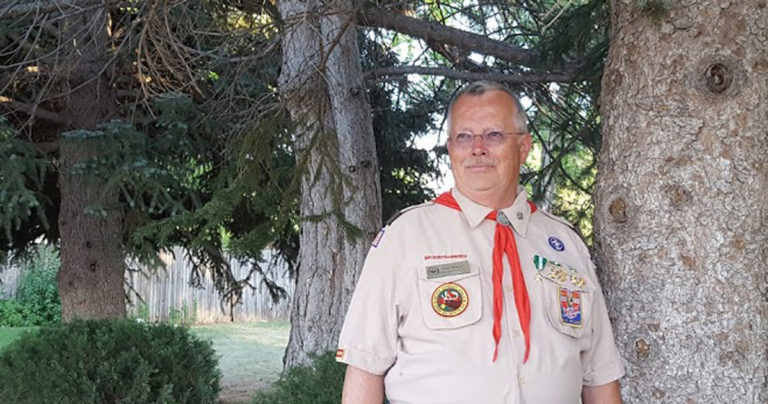What goes on at a weekly troop meeting? Here’s the parent’s-eye view

Just what kind of lessons can a Boy Scout learn at a weekly troop meeting? And how will those lessons help prepare a young person for life?
Julie Labuszewski, the Denver Area Council leader behind this excellent guest post, gives us her perspective as a proud parent.
Enjoy.
How to Turn a Boy into a Leader
By Julie Labuszewski
Start early. Age 11 is good. Buy him a handbook on leadership. Then get him into a uniform. A khaki button-down collared shirt with pockets will work. Teach him to tuck in his shirt, too.
No one wants an unkempt leader.
To succeed, he will need guidance. Try to find him a great leader.
I found Dan Dineen, Scoutmaster of Boy Scout Troop 263 in Littleton, Colo. At age 71, there’s nothing fragile about this man. His build is solid. His handshake is firm. And his voice is strong. He has no time for small talk. He gets to the point, states it clearly and keeps his word.
Born in Chicago and schooled in Detroit, Mr. Dineen began his career as an electrical engineer. The company promoted him to department manager, senior department manager, then plant manager where he led a team of 750 factory workers. Fifty-five years in the manufacturing business taught him some valuable lessons on leadership. While most people believe leaders are born, he has an entirely different viewpoint.
“It’s a learned skill,” he says. “It’s definitely a learned skill.”
So you’ve got your kiddo in a uniform, you’ve found a local troop, now get him to a weekly meeting.
Here’s a sneak peek of our weekly meeting, from one parent to another.
Youth-led lessons
Scoutmaster Mr. Dineen arrives early to unlock the doors to the school cafeteria. Parents, Scouts — dressed in the field uniform (or “Class A”) — and younger siblings begin to show up. There’s a bustle of activity, a buzz in the air.
At 7 p.m., the meeting begins with a formal flag ceremony led by the Scorpion Patrol. The boys recite the Pledge of Allegiance; the Scout Oath, “On my honor, I will do my best…”; and the Scout Law, “A Scout is trustworthy, loyal, helpful, friendly … ”
Three boys hustle in late. The first is wearing a faded black hoodie with ripped skinny jeans. The second is wearing his high school baseball uniform with sunglasses propped on his head. The third wears flip-flops and a Scout shirt tucked into his plaid flannel pants.
Colter, the newly elected 15-year-old senior patrol leader takes the floor facing 24 restless boys, ages 11 to 17.
“There’s a campout next month,” he says. “Who wants to be the Scout in charge?” No hands go up. The younger ones start to fidget and squirm. The older ones chat. The noise escalates.
The SPL asks again, and this time he speaks louder, with authority in his voice. He turns his question into a statement: “We need a Scout to be in charge.”
The commotion settles, and one hand goes up. Then another. He selects the boy who’s not falling off his seat, cracking up uncontrollably.
Falling — and learning
Now it’s time to introduce the guest speaker. But he’s nowhere to be found. A Vail ski patrol volunteer was going to talk about his emergency rescues on the slopes. The boys planned this weeks ago at their monthly patrol leaders’ council. Did anyone call the guest speaker? Who was delegated with that task?
The SPL asks a Patrol Leader, “So did you call him?”
“I forgot,” he says. “My bad.”
The SPL and his assistant converse to quickly come up with a new agenda for tonight’s meeting.
“Any good leader learns a little. Falls. Learns a little bit more. Falls a little bit less,” Mr. Dineen says.
These boys fall often. They leave the snacks in the car, the swim trunks at home and the rain gear in the school locker. They lose their Scout books. They forget their permissions slips. They misplace their shopping lists.
‘That’s how they learn’
Mr. Dineen believes Scouting provides the boy the opportunity to become leaders. This is done by getting the boys in leadership positions and giving them the challenge and the responsibility to run the troop, not the adults.
“It’s a boy-run troop,” he says. “I get them all marching to the same objective, then I step back. That’s how they learn.”
At the last campout, one of the patrol’s attempt to make fried chicken failed miserably. After sizzling chicken legs in hot oil for one hour, the chicken legs still were undercooked. The boys decided to deep fry marshmallows, Pop-Tarts and Oreos instead. Before word got around to the Scoutmaster, they wiped down the picnic table and scrubbed the pot clean.
“If the boys are living the Scout Oath and Scout Law in their daily lives, we’ve succeeded,” Mr. Dineen says.
Above all else: Show up
After 11 years in Scouting, I’ve learned this: Growth spurts won’t wait for your schedule to free up. So show up. In no time, your kiddo will be a teenager.
He’ll grow out the khaki shirt you bought him when he first joined the troop. So you’ll need to get him a bigger shirt, a large: Not the youth large, the men’s large.
But don’t worry.
When he’s 17 and walks into his Eagle Scout board of review, it’ll be tucked in.
About the author
Julie Labuszewski and her family are actively involved in Scouting. She is an aquatic supervisor, merit badge counselor and assistant Scoutmaster for Troop 263.
What goes on at a weekly troop meeting? Here’s the parent’s-eye view
